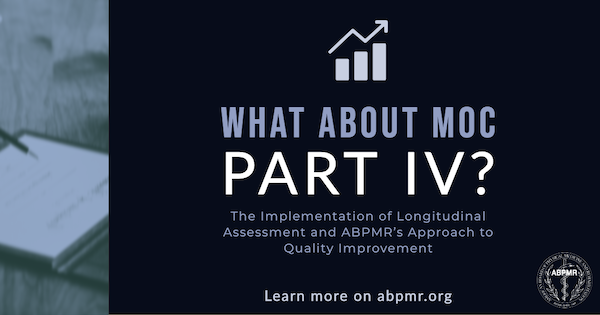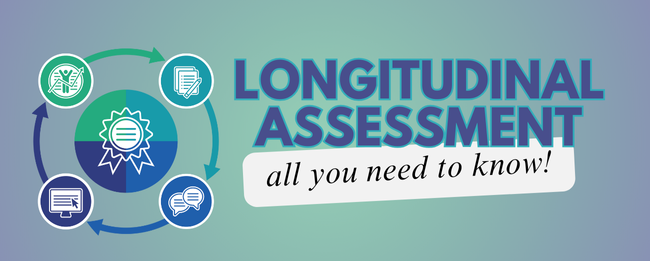LA-PMR
What about MOC Part IV?

Since 2017, the ABPMR has been moving towards a significant change to our Maintenance of Certification (MOC) requirements – specifically, replacing the MOC Examination with longitudinal assessment using CertLink. With that innovation tested, proven, and on its way to implementation, some of our diplomates are asking when the board might consider making changes to other parts of the MOC Program.
And it’s true — in our seminal all-diplomate MOC survey in 2014, you told us you wanted an MOC program that was less burdensome, as well as more valuable, meaningful, and relevant to your practices. In that survey, you scored MOC Parts III (exam) and IV (practice improvement project, or PIP) low on value and relevance.
Since the survey and following a rigorous longitudinal assessment pilot, obvious changes have been made to MOC Part III. That leaves the question: What about Part IV?
ABPMR Considerations for Quality Improvement
For now, no changes are planned for the PIP requirement: All diplomates last (re)certified in 2012 and later are required to complete one project every five years.
In the last few years, we have added many tools to help diplomates complete the PIP requirement, including the PIP Wizard, eight guided PIPs with topic-related prompts, the monthly PIP Spotlight, and QI videos and infographics.
The reasons we’ve added education and resources rather than changing the requirement include the board’s unique position and continued commitment to quality improvement, the changing landscape of medical reimbursement and its emphasis on quality and our obligation to abide by American Board of Medical Specialties (ABMS) MOC standards
The ABPMR’s Commitment to Quality Improvement — While there has been some debate about the role of a medical certifying board in monitoring or requiring quality improvement activities, our board also recognizes the unique position of such a board in the quality arena. While a hospital, insurer or CMS has its own angles (most tied to reimbursement) to monitor and track quality improvement metrics and results, the ABPMR has one objective for requiring quality improvement efforts, directly tied to our mission: To improve the quality of physiatrist-provided patient care. In reviews of more than 700 self-directed PIPs last year alone, we see that these efforts save time, money, and sometimes they even save lives. (Data gathering has begun for outcomes research on PIPs submitted to the ABPMR, so stay tuned!)
It’s also important to point out that the ABPMR doesn’t require a positive outcome before submitting a PIP for MOC Part IV credit — even projects that didn’t meet their objective are accepted for full credit, so long as you show evidence of your efforts to improve and describe what you learned.
Changing Landscape of Medical Reimbursement — Recent changes to Medicare reimbursement and its reliance on quality indicators, including through processes like MIPS and MACRA, show all of us that quality measures aren’t going away; in fact, their influence is growing in medicine. As your board, the ABPMR wants to ensure you stay “in the game” by developing tools and processes that you can use to meet both your continuing board certification requirements and Medicare’s quality indicators.
ABMS MOC Standards — Finally, the ABPMR has an obligation to abide by the MOC Standards set in place by the ABMS, which still require all four parts of MOC for member boards’ programs. Now, the Vision Commission has recently completed its work with recommendations for the future of continuing certification, and new Vision Commission task forces have been established to consider implementation of these recommendations. This work is ongoing, and the ABMS has let us know to expect new MOC standards in the next few years. The ABPMR is looking forward to participating in this work with representation on the task forces and committees in order to shape the future of certification requirements.
The Future of Quality Improvement
After longitudinal assessment is implemented, we hope to begin developing tools within the platform and our new continuing certification program. These tools will consider your interests and longitudinal assessment performance in core areas of PM&R to make specific recommendations for education topics and quality improvement efforts.
This work is part of the ABPMR’s response to our MOC survey: consistently, our goal has been to increase the value of certification. By tying the parts of MOC together into one cohesive whole, your requirements will be increasingly integrated into what you’re already doing, as well as providing tools to explore knowledge gaps, make plans to improve, and ultimately continue your learning and improvement over a career in physiatry.
Questions?
If you have questions about how to choose a PIP or design your own projects, please reach out to one of our MOC experts at the board office today.


